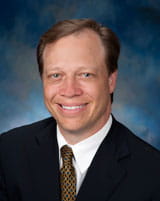
Robert M. Friedlander, MD
Chair, Department of Neurological Surgery
It is a great privilege and honor to be the new chair of this preeminent University of Pittsburgh Department of Neurological Surgery...a department with a great history and tradition.
It is my goal to elevate this department from its already prominent position to be the leader in both delivery and development of care. In achieving these goals, we are fortunate to work with a group of immensely talented and dedicated colleagues in an extraordinary medical center. Our mission will be to deliver the best possible care, to train the next generation of neurosurgical leaders, and to advance our field through innovative and high impact research.
We must always remember the fundamental reason as to why we work in a leading academic hospital. Not only is the patient at the top of our priority list, but we must also make a commitment to advance and improve the manner in which their care is delivered. Ingenuity, persistence, and innovation are traits that are woven into the fabric of this Department. These same qualities and the ability to leverage the strengths of the University of Pittsburgh’s biomedical community uniquely position us to change and improve the way we diagnose and treat neurologic diseases. We are fortunate to be part of an exceedingly supportive medical center where innovative ideas can be turned into transformative therapies. The human capital is extraordinary and the opportunities endless.
Our goal is to provide to each patient the very best that modern medicine has to offer. Patients with complex disorders are seen and evaluated by our multidisciplinary subspecialists, and their cases discussed in one of our many multidisciplinary conferences. One of our strengths is the broad spectrum of available technical approaches for the treatment of both common as well as unusual and complex disease entities. With an unparalleled technical spectrum of abilities, we shall tailor treatment to individual patient needs, always seeking to do our utmost.
Master clinicians equipped with the latest technical facilities and surrounded by a group of talented and most caring health care providers are the keys to quality health care. For example, intracranial aneurysms are evaluated by microvascular as well as endovascular neurosurgeons in multidisciplinary conferences providing the patient both with option and the combined expertise of different therapeutic approaches. Brain and spinal cord tumors are evaluated and treated using a broad variety of techniques including endoscopically approached, microsurgery as well as radiosurgery. Complex spinal disorders are treated by highly experienced neurosurgeons providing a broad spectrum of minimally invasive techniques and modern instrumentation. This kind of work is possible because we have close collaborative efforts with many leading subspecialists from a myriad of different departments.
Advances in therapies will only come by the work of gifted basic and clinician scientists. Our department is fortunate to house a significant number of talented individuals who continuously move our fields forward. Being a clinical department, our overriding goals are to develop novel approaches for the treatment of a broad spectrum of devastating diseases. Given the limited regenerative abilities of the brain and spinal cord following injury, our goal is to develop therapies that both reduce the impact of initial damaging events, as well as to enhance endogenous abilities for neurologic recovery. Through our collaborative work we will develop novel drugs to stop neurologic decline and enhance neurorecovery.
I know that given the combination of our clinical and investigative talents, we are positioned to improve and develop treatments for patients and play a transformative role in the development of new therapies for neurologic diseases. Our past is distinguished, our present is unmatched, and the promise of our future boundless.

















